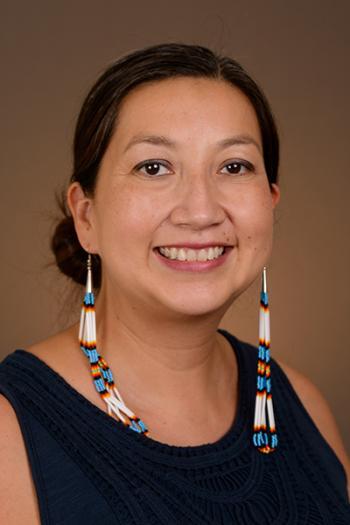 |
Canku Ota
|
 |
|
(Many Paths)
|
||
|
An Online Newsletter
Celebrating Native America
|
||
|
February 2016 - Volume
14 Number 2
|
||
|
|
||
|
Lakota Professor
To Tackle Wastewater Pollution, Mentor Minority Populations
|
||
|
by ASU News
|
||
January 21, 2016 — After five years at the University of Utah, Otakuye Conroy-Ben has returned to the state where she became the first Lakota to earn a doctorate in engineering. As an assistant professor of civil, environmental and sustainable engineering at Arizona State University, her research interests surround water and wastewater treatment and reuse — ranging from understanding what pollutants exist in wastewater to what adverse effects they have and why they sometimes survive treatment efforts. This is the first year at ASU for Conroy-Ben (whose first name is pronounced "Oh-TOCK-oo-yay"). She earned two master’s degrees and a PhD from the University of Arizona, where her doctoral research focused on studying endocrine changes caused by human hormones in wastewater. She also earned a bachelor’s degree in chemistry from the University of Notre Dame. After her doctoral studies, she worked as a project engineer at the Sanitation Districts of Los Angeles County, where she studied odor control in wastewater treatment systems. She returned to academia with a postdoctoral co-appointment at the University of Arizona, where she studied metal and drug-resistant bacteria. In 2009, she was a research fellow at the National Congress of American Indians, where she evaluated climate and renewable-energy policy and adaptation affecting tribal nations. Advancing research in wastewater pollutants Conroy-Ben's research quantifying organic pollutants found in sewage and wastewater-impacted water that have been proven to have adverse effects on animals, including the feminization of male fish. Disturbingly, sometimes these pollutants (a new class of androgens that her team discovered) have been detected at low levels in drinking water, Conroy-Ben said. Another project looked at understanding a specific community’s drug usage or abuse trends by using sewage as a dilute urine sample. Focused on Salt Lake County, she was able to identify that prescription pain medications were more prevalent in affluent suburbs, while methamphetamine abuse was inversely proportional to neighborhoods where the population lacks educational training. As a faculty member in the Ira A. Fulton Schools of Engineering at ASU, Conroy-Ben aims to build on these efforts by starting a research lab that allows certified work with bacteria and controlled substances. Mentoring minority populations Conroy-Ben has a passion for working with Native American and female students to build their presence in engineering. She was born on the Pine Ridge Indian Reservation in South Dakota, annually one of the most impoverished places in the United States. In high school, a physics teacher exposed her to the American Indian Science and Engineering Society (AISES), which helped her to channel her prowess in mathematics toward engineering. Decades later she became an officer on AISES’ Board of Directors. While an undergraduate at the University of Notre Dame, Conroy-Ben did not encounter a single female or minority faculty member in her science curriculum and had no female faculty members in her environmental engineering doctoral program. “Female faculty and faculty of color in STEM are severely lacking at institutions of higher education across the country,” Conroy-Ben said. “In addition to an excellent environmental engineering program and faculty, I came to ASU because of the opportunities to work with under-represented students in STEM." Conroy-Ben found her way to academic success regardless, but she says working with a female or minority mentor would have made the path to success easier. “I want to continue to mentor students who want an excellent research experience and are willing to work hard,” Conroy-Ben said. She is married to Colin Ben, a researcher in ASU’s Center for Indian Education and a doctoral student in Educational Leadership and Policy at the University of Utah.
|
||
|
|
|
|
||
|
|
||
| Canku Ota is a free Newsletter celebrating Native America, its traditions and accomplishments . We do not provide subscriber or visitor names to anyone. Some articles presented in Canku Ota may contain copyright material. We have received appropriate permissions for republishing any articles. Material appearing here is distributed without profit or monetary gain to those who have expressed an interest. This is in accordance with Title 17 U.S.C. Section 107. | ||
|
Canku Ota is a copyright ©
2000 - 2016 of Vicki Williams Barry and Paul Barry.
|
||
 |
 |
|
|
The "Canku
Ota - A Newsletter Celebrating Native America" web site and
its design is the
|
||
|
Copyright ©
1999 - 2016 of Paul C. Barry.
|
||
|
All Rights Reserved.
|
||
